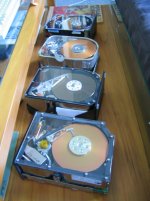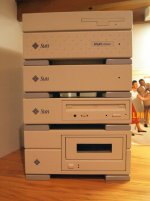falter
Veteran Member
Kind of sounds like a dumb question right? But I've been pondering this as my collection grew from 5 a decade or so ago to 85 today. And I'm curious to hear people's answers because a) I'm just curious and b) hoping to discover things I might do with what I have, to 'exercise' them a bit.
For me, I find I like 'the chase' the best. Finding some half dead (or fully dead) machine somewhere on the cheap, fixing it up and learning as I go. I bought my Lisa 2 with Profile drive for $800 non functional, and spent a Christmas vacation slowly patching traces and bringing it back to life. I bought an Apple II case and spent months researching and locating parts, and rebuilding it to proper specs. Some have stumped me (never did figure out what was wrong with my Rev A. Amiga 1000), but I keep trying now and again.
But I rarely actually use them. My Lisa I fire up once every so many months just to admire it. I have no practical use for it and am leery of putting too many more hours on it given its fragile state. A few machines I do actually pop out and use for a bit: my Apple IIe, my 64 and my Mac Plus all see regular use for games I enjoy playing from my youth. But even there not a lot; at 40 and with young kids I feel kind of silly sitting playing games when there are so many other things going on. I just got an original Sinclair ZX80 yesterday, and it works great.. but I'm like.. hmm.. what do I do with this?
I'd really like to program, but I don't know what or why. Even my BASIC skills are seriously rusting, although I did have fun playing with my Ohio Scientific C1P, and making use of the USS Enterprise graphics. But beyond that, kind of wasn't sure what else to do with it.
These days I've been preoccupied with recreations, mainly my TVT replica project. But one day that will be finished also. Mostly my machines just surround me in my little office, and I look admiringly at them from time to time and marvel when I see a vintage youtube video and say 'Hey, I have that!'. Wouldn't mind getting out to festivals and toting a few along.. but we don't have those anywhere near where I am.
Anyway, let's hear how you use your stuff and particularly any unique purposes you've found for them. My favourite example of 'unique' is that guy that ran Christmas lights with his PDP. Clever!
For me, I find I like 'the chase' the best. Finding some half dead (or fully dead) machine somewhere on the cheap, fixing it up and learning as I go. I bought my Lisa 2 with Profile drive for $800 non functional, and spent a Christmas vacation slowly patching traces and bringing it back to life. I bought an Apple II case and spent months researching and locating parts, and rebuilding it to proper specs. Some have stumped me (never did figure out what was wrong with my Rev A. Amiga 1000), but I keep trying now and again.
But I rarely actually use them. My Lisa I fire up once every so many months just to admire it. I have no practical use for it and am leery of putting too many more hours on it given its fragile state. A few machines I do actually pop out and use for a bit: my Apple IIe, my 64 and my Mac Plus all see regular use for games I enjoy playing from my youth. But even there not a lot; at 40 and with young kids I feel kind of silly sitting playing games when there are so many other things going on. I just got an original Sinclair ZX80 yesterday, and it works great.. but I'm like.. hmm.. what do I do with this?
I'd really like to program, but I don't know what or why. Even my BASIC skills are seriously rusting, although I did have fun playing with my Ohio Scientific C1P, and making use of the USS Enterprise graphics. But beyond that, kind of wasn't sure what else to do with it.
These days I've been preoccupied with recreations, mainly my TVT replica project. But one day that will be finished also. Mostly my machines just surround me in my little office, and I look admiringly at them from time to time and marvel when I see a vintage youtube video and say 'Hey, I have that!'. Wouldn't mind getting out to festivals and toting a few along.. but we don't have those anywhere near where I am.
Anyway, let's hear how you use your stuff and particularly any unique purposes you've found for them. My favourite example of 'unique' is that guy that ran Christmas lights with his PDP. Clever!



![IMG_4383[1].jpg](/data/attachments/7/7896-eea58abe054b857b16fd41257104f4df.jpg?hash=7qWKvgVLhX)